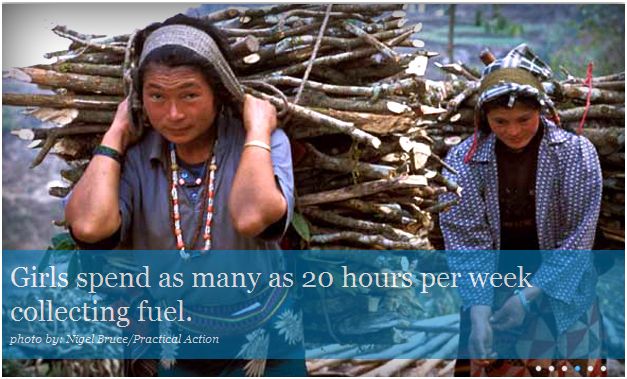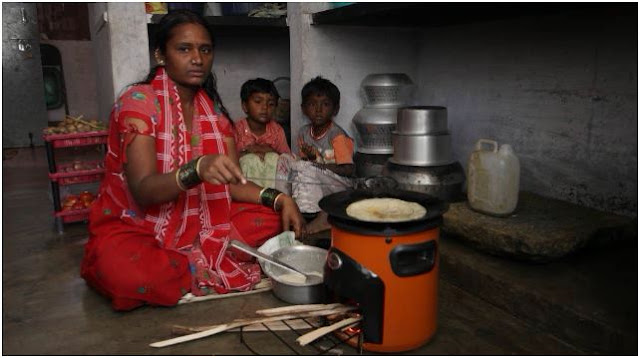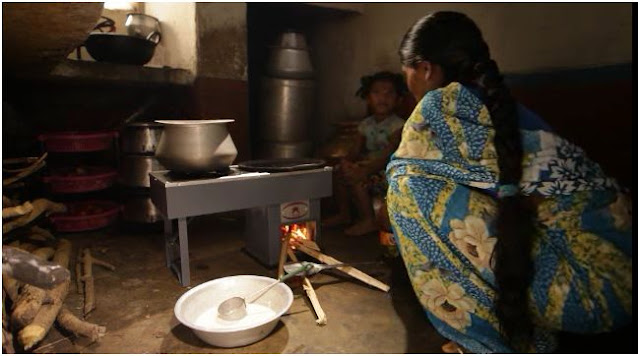The Launch of the Global Alliance for Clean Cookstoves has resulted in the issue -- and the solutions -- getting reported and discussed widely.
The New York Times in its Editorial "Cleaner, Healthier Cookstoves" makes that point that "Researchers have long known of the risks of primitive indoor stoves — including pneumonia in children, lung cancer, pulmonary and cardiovascular disease. They have also known that these stoves contribute to global warming by producing large quantities of fine-particle soot normally associated with diesel engines and burning down forests.
The replacement stoves are relatively small, simple cylindrical devices costing less than $100 and capable of capturing between half and 95 percent of the harmful emissions. The program will sensibly not use the money to buy and ship stoves but, rather, to create small manufacturing companies close to the target populations — creating new jobs in the process. This is an ingenious and overdue response to a global problem."
Says The Economist in its write up, "The best reason for hope may lie in the new-found awareness of market forces among governments and the UN crowd. Pressed on this point, Mrs Clinton says emphatically that the new stoves “must not be given away”. As with anti malarial bed nets, she argues, charging a little makes people value and use them properly.
That will come as good news to the small army of entrepreneurs in the developing world now coming up with novel business models to sell and service the cooking stoves. One such innovator is Suraj Wahab of Toyola, a start-up selling some 60,000 stoves a year in Ghana by offering micro-credit. His advice to the new UN coalition is “please don’t offer handouts and don’t give away stoves.”
The Guardian blog reports Simon Bishop of Shell Foundation saying "Having a sitting US secretary of state say that the world needs to focus on harmful cookstove smoke - which kills 1.9 million people a year globally - is a huge, massive boost to an issue that has for too long been seen as a low priority by the global community."
The remarks by Achim Steiner, UN Under-Secretary General and UN Environment Programme (UNEP) on the launch of the Global Alliance for Clean Cook Stoves was echoed in the African press, "There have been cook stove initiatives before—some have worked and some have not. The expertise in this room knows why—and it is this experience and these skills that will make this alliance a success. Indeed, when I look at the faces out there and the organizations you represent, I seesuccess stories everywhere. US EPA is partner along with the government of the Netherlands and UNIDO and UNEP among others in the Partnership for Cleaner Fuels and Vehicles—phased lead out of petrol in Africa, and almost everywhere else in around three year. The UN Foundation and Shell Foundation, partners in for example the Indian Solar Loan project that through working with banks assisted 100,000 people in rural India to access solar power."
The Huffington Post writes "This extraordinary coalition has come together around one core belief: The time is right for the world to focus on this issue. The Alliance needs others to step up. The global community needs to make cookstoves a priority. If it does, progress will be made toward the MDGs, millions of lives will be saved, and the global environment protected. Cooking shouldn't kill. It shouldn't kill women and children. It shouldn't kill the environment."
Morgan Stanley in a press release announced that it is a Founding Partner of the Global Alliance for Clean Cookstoves. "Given our long track record of supporting pediatric health initiatives and our commitment to protecting the environment, we are very proud to be a Founding Partner of the Global Alliance for Clean Cookstoves," says Tom Nides, Chief Operating Officer of Morgan Stanley. "We look forward to committing our intellectual capital to this effort and working with our Alliance partners to address this pressing issue in the months and years ahead."
A number of developments indicate that there is increasing momentum for the dangers of traditional cookstoves to be successfully addressed. These include advances in stove design, testing and monitoring; the potential of carbon financing to reduce stove costs; and commercial entrants with significant production capacity.
"While the harmful and tragic effects of traditional cookstoves have long been known, we believe the right conditions are in place to address this problem more effectively than ever before," said Audrey Choi, Head of Global Sustainable Finance at Morgan Stanley. "We look forward to contributing Morgan Stanley's intellectual capital to solving environmental and health problems that require market-based solutions and economic insight."
Noted the BBC commenting on the launch of the Alliance "It is believed to be the first major attempt to tackle the issue worldwide. The project will attempt to build on national programmes already underway in India, Mexico and Peru. It aims to introduce modern low-pollution stoves to the homes of 100 million poor people by 2020. Clean stoves run on biomass (with chimneys and clean-burn mechanisms), or gas, or on solar power. The stoves programme would help to protect poor people from eye disease, lung disease and cancer; save forests from being ravaged for fuel; reduce CO2 emissions and reduce emissions of black smoke, which also contributes to global warming. But it is a huge challenge for a global partnership to deal with the scattered homes of the estimated 3 billion poor people who cook on stoves or open fires."
SNV a Founding Partner of the Alliance in a press release quoted Dirk Elsen, SNV Chief Executive, stating, "The environment, renewable energy, and improved welfare of women and children are clearly defined SNV strategic concerns and each of our projects around the world is undertaken with them in consideration. Therefore, we are very excited about joining the Global Alliance for Clean Cookstoves whose mission and goals fit in perfectly with these SNV strategic priorities. As a Founding Partner in the Alliance, we intend to take an active role in helping define standards, encourage research, and set the vision for the global deployment of improved cookstoves."
SNV has successfully promoted the implementation of biogas, biofuels and clean cookstove programmes in Africa, Asia and Latin America. It is committed to using its expertise in developing market-based solutions and working with the private, public and non-profit sectors to ensure the worldwide dissemination of bio-energy technologies, thereby improving the health of women and children as well as mitigating the impact of climate change. As a part of the Alliance, SNV can leverage this experience to scale up efforts in the clean cookstove sector, which is reaching a "tipping point" thanks to advances in cookstove design and testing, new research on harmful effects of inefficient cookstoves, an increased awareness of the need to address climate change challenges and ability to reach scale via carbon finance.
The Christian Science Monitor noted that "the idea is not simply to flood poor countries with a one-size-fits-all cooking alternative – an approach that hasn’t gotten very far in the past – but rather to consult finicky local tastes and use local markets to develop and distribute different cookstoves for different regions and cultures. The objective: create cleaner, healthier, environmentally sound and locally adapted stoves that women will want."
Environment News Service quotes UN Foundation President Timonthy Wirth saying "Energy is the essential enabler of the Millennium Development Goals," said United Nations Foundation President Timothy Wirth. "Broader access to electricity and modern fuels doesn't just provide light or move machinery. It powers education, health care, and prosperity, and through sustainable technologies, such as solar panels and clean and efficient cookstoves, lives are saved and our environment protected."
"Cooking a meal shouldn't be hazardous to your health," Wirth said. "Cookstoves that reduce fuel consumption and operate cleanly will save lives, prevent disease, provide more time for women and girls to devote to schooling and earn money and reduce environmental degradation. That addresses almost all of the MDGs."
"For 10 years we have been helping to deliver market-based solutions to selling clean cookstoves in India, China, Central America and Africa. The sector has made great progress," said Shell Foundation Director Chris West. Still, he said, "Stove manufacturers face numerous barriers to successfully selling clean cookstoves at scale, and just like any infant industry they need support to address those barriers."
skip to main |
skip to sidebar
THE READING LIST
- World Lung Foundation: Acute Respiratory Infections Atlas
- Searching for Fundi and studying the three-stone stove in Kalinzi
- Karibu Tena: Rocket Stoves in Mwamgongo
- Black Carbon Emissions in Asia
- Capacity Development for Scaling Up Decentralized Energy Access Programmes: Lessons from Nepal on its role, costs, and financing
- The Indian National Initiative for Advanced Biomass Cookstoves: The benefits of clean combustion
- The Hartwell Paper: A new direction for climate policy after the crash of 2009
- PERU HEALTHY KITCHEN/HEALTHY STOVE PILOT PROJECT
- US Climate Bill: Kerry Lieberman' American Power Act
Followers
Blog Archive
-
▼
2010
(93)
-
▼
September
(11)
- Spreading Clean Air
- The Silent Killer Now A Global Concern
- Shell Pledges $6 Million For Global Clean Stove In...
- UN-Led Global Alliance for Clean Cookstoves Launch...
- Secretary Clinton's Speech At The Launch of the G...
- Secretary Clinton to Announce Global Alliance for ...
- Indoor Air Pollution: A Video
- Cornell Research on Biochar and Cook Stoves Gets F...
- Studying The Three-Stone Stove In Kalinzi
- US EPA Makes Cookstoves A Priority
- X PRIZE, Indian Government, IIT Delhi to Partner...
-
▼
September
(11)
IMPROVED COOK STOVES
VIDEO RECORD
Enterprise Based Solutions for Improved Cook Stoves
Routes to Market for Improved Cook Stoves
Shell Foundation Press Conference on Indoor Air Pollution
Interview Jeroen Blum, Deputy Director, Shell Foundation
Clearing the Air on Indoor Air in Koppal
Khidki Amma Noses Around
Envirofit Cookstove Ambassador Minniamma
South India Pilot Campaign
Shell Foundation Campaign in Shimoga
Secretary Clinton Announces the Global Alliance for Clean Cookstoves
The Burden of Firewood
The Silent Killer In The Kitchen
The Stove Solution
The Stove Solution
The Aprovecho Institutional Rocket Stove
Step by step guide to build a RIPPLE Rocket fuel efficient cookstove
Malawi – The RIPPLE Rocket fuel efficient cookstove






